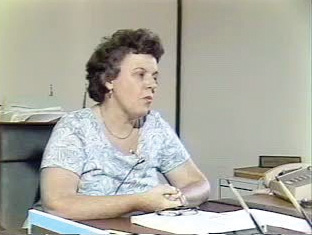December 9, 2010
 Marion Fahey: Marion Fahey at her desk in the 1970s WGBH photo.
Marion Fahey: Marion Fahey at her desk in the 1970s WGBH photo.
The news that the Emily A. Fifield Elementary Schools is slated to be closed brought back vivid memories as well as a sense of sadness about the loss of what once was a wonderful place in my life. The three-story building was my home away from home for two years during the mid-1950s when I was a fifth and sixth grade student there.
Teachers at the school provided me with the resources to attend Boston Latin School and for that I will forever be thankful. While it was hardly an easy move to and through the Latin School, my years at the Fifield had given me a leg up on having what it took to make it educationally, athletically, and socially at BLS, and beyond.
The friends who lived in the neighborhood outside of Codman Square – my Fifield classmates -- were drawn from a rich ethnic base; although predominantly white, our roots were in any number of European and Middle Eastern countries. But we were bonded by many common threads: All of our fathers worked and our mothers stayed at home taking care of the family; even though televisions were showing up in many of our friends’ parlors, we spent most of our free time playing stickball in the streets or baseball at Franklin Field once Little League season came around; and when winter arrived, we hoped that the big kids at Dorchester High would let us use a patch of the good ice that had formed on flooded Roberts Field.
The range of IQ numbers at the Fifield in my days there may have been as great as at any public school, but by the fifth and sixth grades we were all expected to have library cards and to use them regularly; in math, to go beyond long division and comprehend fractions and percentages; and in civics, to know well Boston’s unique place in American history.
Expectations about good grades were as high at the Fifield as at any of Boston’s public schools, but in the fifth grade, I received the sort of blessing that all parents know makes the principal difference in the classroom – an enlightened teacher. Mine was Marion Fahey, who 20 years later would be the superintendent of Boston Public Schools.
She was the first teacher I knew who wore perfume and one of the few whom I had encountered who was as comfortable smiling or even laughing in the classroom as she was in demanding peak performances from a stern face. If it were true at the time that women teachers in Boston schools could not marry out of concern that they would be taking the job from a male breadwinner, Miss Fahey was the first of my teachers who might have tested that rule.
But it wasn’t just her appearance that made her stand out. She also knew that learning involved more than memorizing or the droning recitation of facts. It was from Miss Fahey that I realized that lessons were to be learned and books were meant to be read not just for report cards but for the sheer fun of knowing things and learning how to write about them.
Until her class, the only reading that gave me sheer fun came from the sports pages of The Globe, the Record and American tabloids, and the Sporting News, which my uncle who lived upstairs subscribed to. But Miss Fahey showed me that adventure and suspense didn’t just play out on a ball field or in box scores. That those orange- and green-covered biographies lining the Young Adult section of the Codman Square Library held stories in them that could equal a Willie Mays catch or a Ted Williams swing. Well, almost equal.
And it wasn’t just Miss Fahey who made education enlightening at the Fifield. E-mails to several of my cousins who also attended the school during these years - among them a surgeon, engineer, classics scholar, and pharmacist - provided sweet memories of being in classes taught by Miss Bell, Miss Gavin, and Miss Miller, as well as a needed lesson or two in discipline from Mr. Gorman, Mr. Dinublia, and Mr. Harris.
And that love of reading – and learning - first sparked at the Emily A. Fifield elementary school has stayed with me all those years - through Latin School, Boston University, Suffolk Law School and a rewarding career as a reporter and editor at The Boston Globe. About five years ago, I was asked by Fifield’s then principal, Craig Lankhorst, to speak to the graduating class of fifth graders about my experiences there some 50 years earlier. The predominantly white student body of my day has become largely African-American, but there was no difference in their well-behaved demeanor or the pride that their parents showed in seeing that their children had met the expectations of another generation of Fifield School teachers.
And when I told them of the requirement that those in my class all had have library cards, they laughed knowingly. It was clear that despite the decades that separated us, yet another generation of Fifield graduates had been introduced to the wonders of reading that came with having a Boston Public Library card.



